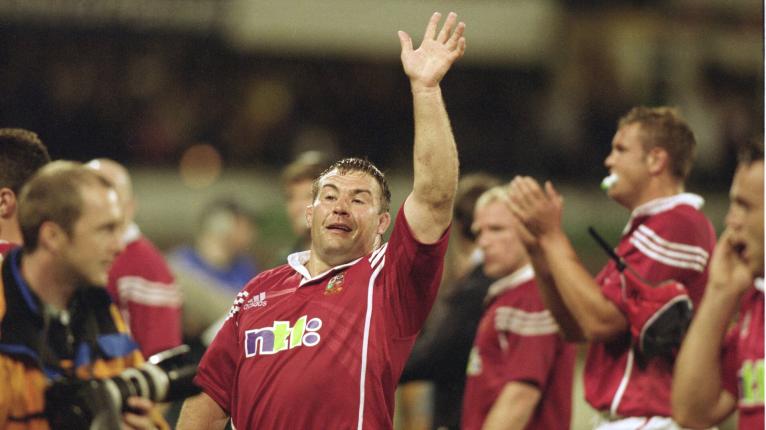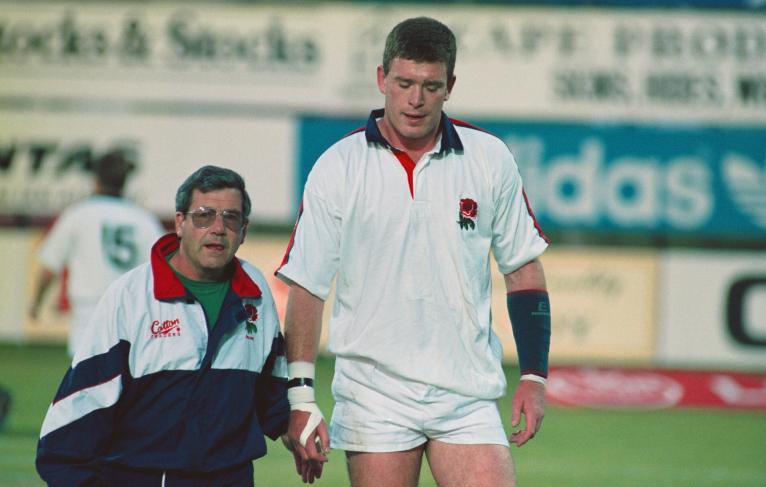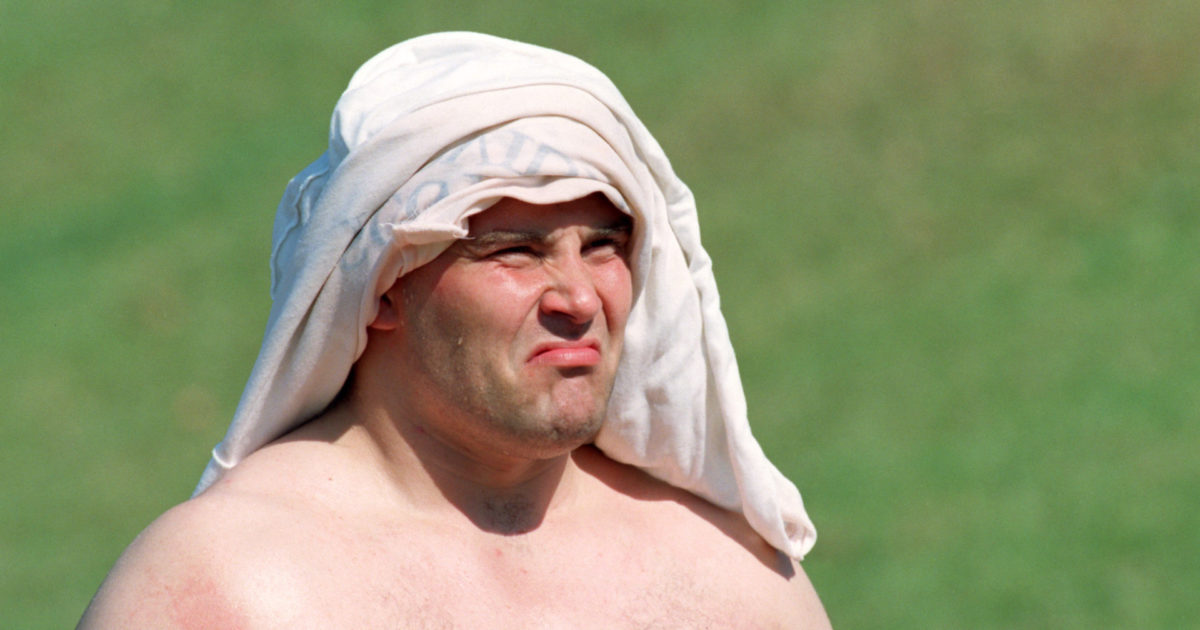'My jersey was covered in blood' - The day the England Fun Bus started its record breaking journey

When Jason Leonard emerged from the underground changing room into the intimidating atmosphere of the Velez Sarsfield stadium in Buenos Aires in 1990 he had no idea it signalled the launch of a record breaking England career that would see him rise to the Presidency of the Rugby Football Union.
On the 30th anniversary of his debut, Leonard admits the only thought in his mind that day was proving he deserved the No1 jersey against a fearsome Argentina pack in the first sporting fixture between the countries since the Falklands War.
The 21-year-old, who remains his country’s most capped player with 114 appearances, helped England to a 25-12 first test victory achieved with fellow debutants Dean Ryan (4 caps), now the Dragons director of rugby, Harlequins No10 David Pears (4 caps) and Orrell wing Nigel Heslop (10 caps), who a year later would be knocked out by punches from Serge Blanco and Eric Champ in a ferocious 1991 Rugby World Cup quarter-final in Paris.
All four new caps survived their baptism of fire in an England team missing eight players who were rested following the 1990 loss to Scotland at Murrayfield that cost the team a Grand Slam and the majority would return for the clash with Argentina three months later when 18-year-old Pumas hooker Federico Mendez was sent off for turning Paul Ackford’s legs to jelly with a massive punch at Twickenham.
Sandwiched between those two momentous matches was the first test in Buenos Aires and a victory that deserves recognition 30 years on not only for giving the rugby world “Fun Bus” Leonard, one of its greatest characters, but for the way England defied the odds to win on Argentinian soil with the eighth anniversary of the Falklands War swirling around them. Leonard, a member of England’s 2003 Word Cup winning team, said: “ To play just one match for England that’s the dream you grow up with and it turned out that the first three games of my test career were all against Argentina.”
This was an England team shorn of Dean Richards, Ackford, Mike Teague, Paul Rendall, Rory Underwood, Jerry Guscott, Simon Halliday and Rob Andrew. Captain Will Carling was still able to call upon the experience of No9 Richard Hill, Simon Hodgkinson’s kicking and up front the combative Jeff Probyn, Brian Moore, Peter Winterbottom, Mick Skinner and Police Constable Wade Dooley who took young Leonard under his wing.
Leonard, who started playing at Barking, was barely into his senior career with Saracens and was supposed to be the back-up to Moseley’s experienced loosehead Mark Linnett, but proved in the brutal second match of the tour with Tucuman he could handle the rough stuff.
Tucuman, known as the Clockwork Orange, had fought battles with France and the New Zealand Maori and their fans welcomed Carling and his team by burning a Union Jack. After being barged at the first line out Dooley took control and told Leonard that at the next line out he would hit his opposite number on the way up and the youngster would thump him on the way down. “Tucuman has a big reputation of intimidation of touring teams but they were also one of the regions that had the biggest losses in the Falklands War,” explained Leonard. “That is why tempers were running high and the rugby was brutal in those days.”
Pears describes the Tucuman game as the most intimidating atmosphere he ever experienced and was amazed to see a bathroom tap land on the pitch next to him having been thrown by one of the locals as he prepared to kick a penalty which helped secure a morale boosting 19-14 win. “I had a kick charged down early in the Tucuman game and they scored and I thought “there goes my first cap”. But I kicked an important penalty and we won.”
Leonard, Pears, Ryan and Heslop were selected for that first test and changed in an underground dressing room that required the players to walk up a spiral staircase to reach the hatch that was pulled opened to allow them onto the pitch which was surrounded by mesh fencing to keep the fans off the pitch. Pears remembers emerging from the dark and hitting the blinding sunlight and feeling as if he was “floating on clouds” but reality struck as soon as the whistle blew.
Leonard takes up the story: “After the spiral staircase you went out onto the pitch and the first thing that hit you was the noise and then the first image was a soldier armed with a machine gun with an Alsatian dog on a lead. I remember thinking “ who dresses like that for a game of rugby? It was a football stadium with wire in front of the fans so that no one could get on the pitch plus barbed wire at the top. Our National Anthem sounded like it was on a crackling record and halfway through someone took it off.

“Just before the game I had looked around the changing room and I was alongside Probyn, Moore, Dooley, Skinner and Winterbottom and I was confident we were going to win. Wints just told me to concentrate on my job and they would look after everything else.
“I remember Union Jack flags being burnt in the crowd and as the game progressed oranges were thrown at us by fans and then as the game wore on we found an empty whiskey bottle had landed on the pitch followed by a pair of scissors which we handed to the referee. The largest object was a Victorian style bath tap which seemed to be about a foot long. Who the hell brings that to a match?
“At the first ruck I got punched and before I could react, Wade’s big fist crossed in front of my face and connected with the opposition player. Every single ruck was a brawl and my jersey was covered in blood because the guy I was propping against had a cut to his head.
Best advice Jason Leonard received on @EnglandRugby debut against Tucuman in 1990 " You hit him on the way up and I will hit him on the way down" courtesy of Wade Dooley at the second line out! #oldschool
— chris jones (@chrisjonespress) August 14, 2018
“I had played with Dean Ryan in my first year at Saracens and with Pearsy for England U21s and so Nigel Heslop was the only one who was new to me. While tempers were running high on the pitch, off it Argentina was a wonderfully hospitable country to experience and I am still in touch to this day with Diego Cash who propped against me in the second test on that 1990 tour.”
Ryan was in the middle of maelstrom. He had joined the tour straight from a season in New Zealand and relished the physical challenge although he found the time spent in Tucuman trying for other reasons.
“The New Zealand Maoris rugby team had visited before us and a television had been thrown out of a hotel widow and so when we checked in none of the rooms had any televisions so we just sat in the corridor chatting,” said Ryan who would score a try on his test debut. The Dragons boss got the distinct impression all of the local players who had been upset during the early tour games had assembled in the national team and his readiness to fight back did not win him fans amongst the small contingent of Rugby Football Union grandees in the stands.
The late Barbarians president Micky Steele-Bodger, summarising on radio, witnessed a punch-up involving Ryan and said: “I hope this man never plays for England again.” It was a harsh verdict given what England were dealing with on the pitch and Ryan admitted: “I did hear about that comment and some of the senior players were pretty upset,” said Ryan. “That would explain why I never got to play for the Barbarians after that test!

“Coming from the NPC in New Zealand I was fairly battle hardened and knew with Dean Richards not touring it was a big chance for me.”
Heslop is proud of having helped England win in Buenos Aires – where Simon Hodgkinson kicked 17 points – but admits playing in the 51-0 victory over the Pumas three months later at Twickenham felt like his first cap. “ It was the fact my Mum and Dad were in the crowd and playing at Twickenham had been my dream. I was in tears in the dressing room.” said Heslop. “ I was proud to have won on my debut in Argentina and went on tour thinking I was making up the numbers with Chris Oti and Tony Underwood in the squad. Running out for that first test was like entering a Roman Arena and I managed a try in the second but we lost 15-13 which was a real disappointment.”
While his fellow debutants had shorter test careers, Leonard went onto to become a rugby centurion and the ultimate “blazer” as RFU President despite having to undergo neck surgery in 1992 to save a career that lasted a remarkable 14 years. That first cap has a special place in his collection although he was told by flanker Winterbottom on the coach heading back to the team hotel to enjoy because it was probably the only one he would get.
The reason his career could have been cut short? “Well, you have to sing a song in front of everyone and the travelling RFU committee men were also on the coach,” added Leonard. “ I chose as very rude, blue ditty and belted it out and when I sat back down next to Wints he smiled and said “make the most of today because after that song you won’t be playing many times for England!”





































